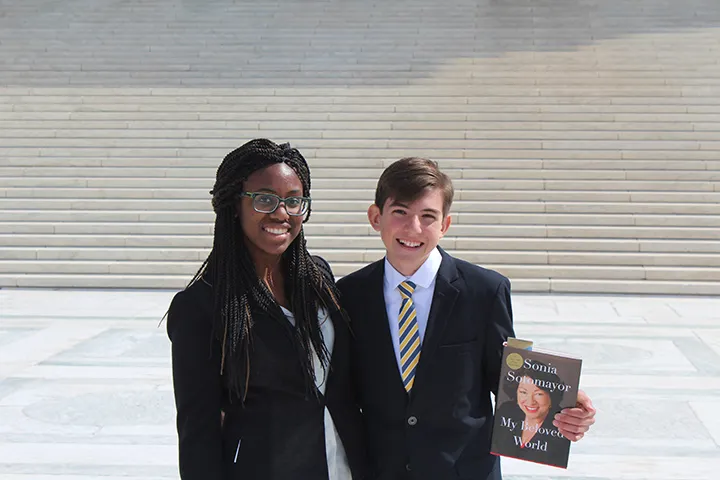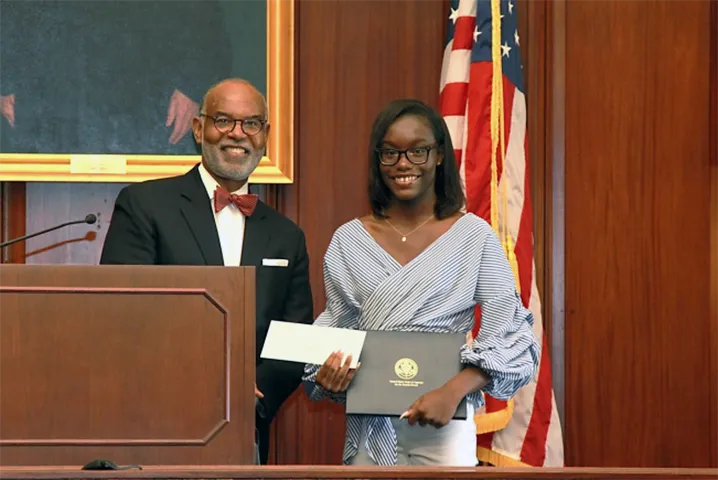Rebecca Thompson had never thought of a career in the law before a high school teacher encouraged her to enter an essay contest sponsored by the U.S. Court of Appeals for the Fourth Circuit. Researching an essay on access to justice opened Thompson’s eyes to legal mistreatment afflicting the poor.
Alexander Ashman also had given little thought to the law, until his history teacher introduced him to a Federal Bar Association national essay contest. His impassioned commentary about his grandmother’s encounters with antisemitism won him first prize—and a “life-changing” visit to the U.S. Supreme Court.
“When we went to the Supreme Court, seeing the actual courtroom itself, knowing how many famous cases had been argued and determined there, was really just overwhelming for me,” said Ashman, an eighth-grader who lives near Phoenix. “It was just an incredible experience. I am so grateful that my teacher recommended this.”

Federal Bar Association civics essay contest high school and middle school winners Isabelle Scott and Alexander Ashman visiting the Supreme Court on March 17, 2017. Photo credit: Federal Bar Association.
Growing numbers of federal courts, along with judges in the Federal Judges Association and lawyers in the Federal Bar Association, are using essay contests to inform and inspire young people about how the Constitution and courts protect personal liberties.
The essays are intended to counteract a steep decline in civics awareness. A 2017 survey showed that only 26 percent of the public could identify all three branches of government.
“The next generation’s view of the Judiciary is as important as the current generation,” said U.S. District Court Judge Marilyn L. Huff, president of the Federal Judges Association who serves in the Southern District of California. “Sadly, studies have shown that awareness of even the core functions and structure of government is lacking.”
Contest winners receive modest cash prizes, and a chance to meet prominent jurists and lawyers.
The Ninth Circuit, which conducts the Judiciary’s most established contest, last year solicited essays and videos about Korematsu v. United States, a landmark case concerning the World War II internment of Japanese Americans. Winners met Supreme Court Justice Neil M. Gorsuch.
“As a neutral and impartial institution, our court system is uniquely situated to ensure that the next generation is informed about our democracy, the role of the courts, and civics in general,” said U.S. District Court Judge Janis L. Sammartino, also of the Southern District of California, who is chair of the Ninth Circuit Courts and Community Committee. “The Ninth Circuit’s civics contest takes the message on civics to the schools and makes a difference, one student at a time.”
This year, the Ninth Circuit contest is focusing on the 14th Amendment, and its impact on young people. The Federal Bar Association and Federal Judges Association are jointly sponsoring a separate contest using the same theme. The partnership enables the three entities to reach more schools and students with a common educational goal.
“We realized that several different groups had the idea that essay contests are important and raised civic awareness,” said Maria Z. Vathis, Federal Bar Association president-elect. “We all agreed that the 150th anniversary of the 14th Amendment is such an important amendment. That was the thought. Let’s all work together to raise awareness.”
The Fourth Circuit contest also will focus on the 14th Amendment, which guarantees equal protection of the law to all citizens.
“We can’t take it for granted that people are always going to support our justice system,” said Roger L. Gregory, Chief Judge of the Fourth Circuit Court of Appeals. “If we can’t continue to inform and inspire young people, then we’re going to have a hard time continuing our great system.”

Fourth Circuit Chief Judge Roger L. Gregory presents Rebecca Thompson an award for winning the 2017 Fourth Circuit essay contest.
Thompson, who won the 2017 Fourth Circuit contest, said her research stretched her thinking, particularly a jarring account of young teenagers being sent to adult prisons. “These are things I never knew about,” said Thompson, a high school senior in Northern Virginia.
During a Constitution Day ceremony in Richmond last September, “I just felt at home. It pushed me to want to get into the justice field,” Thompson said. “I would tell anyone to enter this contest. Even if you don’t win a prize, the research will teach you so much.”
Ashman said his grandmother’s stories of childhood prejudice made him appreciate the importance of impartial courts. In his essay, he wrote, “As a Jewish boy coming from a multicultural family with an ethnic mosaic of friends, an impartial judicial system indicates absolute peace of mind for me. Because impartiality means no discrimination, I do not have to be scared of relatives or classmates being wrongly sentenced solely based on preconceived notions.”
The contest sponsors say they in turn are inspired by young people who care deeply about a just society and court system.
“I am absolutely encouraged by the students and their work,” said U.S. Magistrate Judge Michael Newman, of the Southern District of Ohio, who spearheaded the first Federal Bar Association contest. “While we read in the media about an overall lack of civic awareness, the students’ essays have been extraordinary. They demonstrate that many young people have a considerable understanding of the Constitution, the Bill of Rights, and Supreme Court caselaw.”
“They’re amazing,” said Huff, who was a school teacher before entering the law and becoming a judge. “Some are really able to pull it all together and give true meaning to their essays and videos. I am trying a full-court press to get as many participants as possible.”
Subscribe to News Updates
Subscribe to be notified when the news section is updated.
